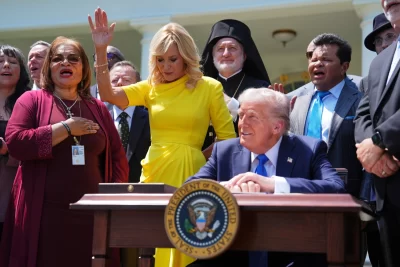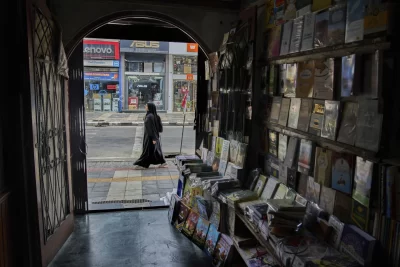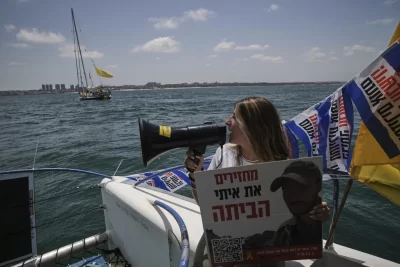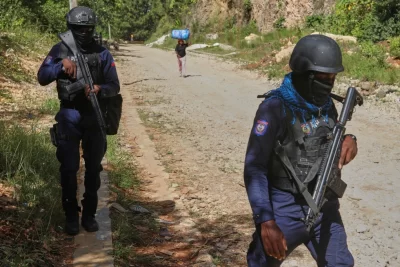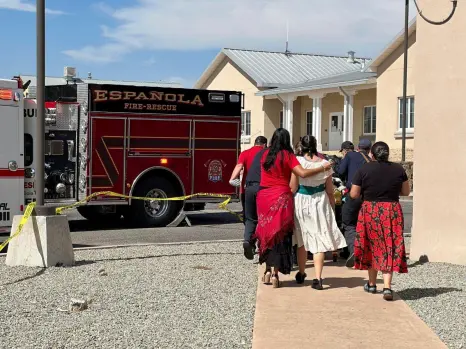
Chaos erupted Thursday as a gunshot rang out during a protest in northern New Mexico where officials had planned to install a statue of Spanish conquistador Juan de Oñate, an event that county officials had already postponed anticipating that tempers would flare.
One man was struck by the gunfire and rushed to the hospital as Rio Arriba County sheriff’s officials took the suspected shooter, 23-year-old Ryan Martinez, into custody. Authorities said they were not currently seeking any other suspects in connection with the shooting.
Oñate has been a controversial figure in New Mexico’s history for generations, with activists targeting the statue and other likenesses of the Spaniard for his oppressive and sometimes brutal treatment of Native Americans during his country’s conquest of what is now the Southwestern United States. Some Hispanics have pointed to the statue as a symbol of their heritage.
Although the county had postponed the installation of the statue the previous day because of public safety concerns, people still turned out.
Protesters arrived Tuesday and pitched tents. They placed offerings on and around the empty pedestal to Oñate: pottery, corn stalks, votive candles, a basket of vegetables. Banners read, “not today Oñate,” and “celebrate resistance not conquistadores.”
One person yelled, “Hey, hey, hey. Let him go!” as he broke free and jumped back over the wall. That’s when he pulled a gun from his waistband and fired a single shot before running off. Screaming ensued.
One person could be heard saying, “Help me! Help me!” and “I can’t breathe.”
The shooting occurred just outside the doors of county offices, which include sheriff offices. More than 20 law enforcement vehicles responded, crowding an Española city roadway that overlooks the Upper Rio Grande Valley.
The wounded man, whose name was not immediately released by authorities, was shot in the upper torso and was being treated at a local hospital, authorities said.
Authorities said a motive for the shooting was unclear.
“Once again, the saddest part about this is we have another incident of gun violence,” county Sheriff Billy Merrifield said at a brief news conference.
Merrifield said he expressed concerns about safety issues to county commissioners about reinstalling the statue in Española outside the county building. He said he was grateful to commissioners who decided against putting up the statue.
He declined to take any questions, saying New Mexico State Police were handling the crime scene and the investigation.
State police didn’t immediately respond to emails or phone calls Thursday night from The Associated Press seeking any information about the condition of the victim or any charges that had been filed or were pending in connection with the shooting. A dispatcher who wasn’t authorized to release any information said additional details were expected to be released later Thursday night or Friday.
Jennifer Marley, of San Ildefonso Pueblo, an organizer for the Native American rights group The Red Nation, said the shooting took place within view of the county sheriff’s department building but without any officers on site to intervene.
“It was awful. This was a peaceful call to action. We were there to celebrate the fact that the statue was not going up,” she said.
She described Oñate’s legacy as one of genocidal violence. “It’s really ironic, I was basically saying that this violence is ongoing … even when we are being peaceful and prayerful. The shooting began while I was speaking.”
The shooting happened on the day the New Mexico Department of Health released a report on gunshot victims treated at New Mexico’s hospitals. Gov. Michelle Lujan Grisham commissioned the report earlier this month, alongside issuing a public health order that temporarily suspended gun rights in the Albuquerque area over recent gun violence.
A federal judge blocked aspects of it while a flurry of lawsuits alleging violations of constitutional rights played out.
According to the report, there was a 16% increase in patients admitted to intensive care units for firearm injuries between 2019 and 2022. Gunshot victims transferred from emergency departments to operating rooms increased by 61% over the same time frame.
The report also noted that deaths from firearm injuries between 2017 and 2021 increased among Hispanics, non-Hispanic Native Americans and non-Hispanic Black populations.
Tony Ortega, a 78-year-old retired technician who worked at Los Alamos National Laboratory, said he was glad to hear the county planned to put the Oñate statue back on public display as a symbol of local Hispanic pride. But he said he knew it would cause trouble.
“I knew this was going to be a problem. Native Americans don’t want it,” Ortega said. “They think Oñate was a bad person more or less.”
Oñate, who arrived in present-day New Mexico in 1598, is celebrated as a cultural father figure in communities along the Upper Rio Grande that trace their ancestry to Spanish settlers. But he is also reviled for his brutality.
To Native Americans, Oñate is known for having ordered the right feet cut off of 24 captive tribal warriors after his soldiers stormed the Acoma Pueblo’s mesa-top “sky city.” That attack was precipitated by the killing of Onate’s nephew.
In 1998, someone sawed the right foot off the statue of Oñate near Española, where it had been on display until it was taken down in 2020 amid a national movement for racial justice that sought to topple countless monuments.
A likeness of Oñate among a caravan of Spanish colonists set in bronze outside an Albuquerque city museum also drew protests in 2020 that resulted in it being taken down.
Rio Arriba County Commission Chairman Alex Naranjo, a Democratic former magistrate judge and school board member, said he is still committed to returning the statue to public display. He said the bronze likeness and companion cultural center in the nearby community of Alcalde was commissioned at a cost of more than $1 million in county, state and federal funding, in a project championed by his uncle Emilio Naranjo as a state senator and public figures including former Gov. Bill Richardson.
He blamed Thursday’s confrontations on “disrespectful” protesters from beyond the Española Valley, though many protesters Thursday cited local Native American ties.
“To me it’s a matter of principle,” said Naranjo, who traces his ancestry to Spanish settlers who arrived in the late-1500s. “I don’t question anybody who disagrees with me as long as they do it in a respectful, cordial way.”
____
Associated Press writers Terry Tang and Walter Berry in Phoenix and Christopher L. Keller and Susan Montoya Bryan in Albuquerque contributed to this story.

